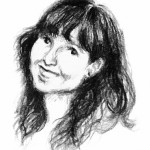I didn’t expect to leave a lecture on writing with the advice to go home and watch television, but that’s what happened Monday night at a Q&A with Louise Glück. She spoke about her most recent book, “Faithful and Virtuous Night,” a work that deals with the long periods of unproductivity that punctuate the life of a writer — the times when writing is difficult, often impossible. While so much of her professional life was consumed by these sorts of periods, she felt it strange she’d never addressed them, never been able to address them, in her work. The book she read from and discussed with us was her way of finally doing so.
 I haven’t had this experience of all-consuming, paralyzing inability to produce work while at Yale. Our four years here are in some ways a march of productivity toward a diploma. Of course, that’s not to say there isn’t meaning in this productivity. As much as a due date or a deadline is a command to produce, it’s also the chance to learn and to make something to take pride in. But to experience true unproductivity — all its anxieties, its paralyzing self-doubts, its mysterious ways of turning off functions that often feel natural — one cannot be at Yale, where productivity is consistently expected. Even breaks are spent in anticipation of the next to-do list, whether it’s beginning final papers over Thanksgiving, shopping for classes over winter break or adding line items to one’s resume over the summer.
I haven’t had this experience of all-consuming, paralyzing inability to produce work while at Yale. Our four years here are in some ways a march of productivity toward a diploma. Of course, that’s not to say there isn’t meaning in this productivity. As much as a due date or a deadline is a command to produce, it’s also the chance to learn and to make something to take pride in. But to experience true unproductivity — all its anxieties, its paralyzing self-doubts, its mysterious ways of turning off functions that often feel natural — one cannot be at Yale, where productivity is consistently expected. Even breaks are spent in anticipation of the next to-do list, whether it’s beginning final papers over Thanksgiving, shopping for classes over winter break or adding line items to one’s resume over the summer.
With the “fall back” time change, I’m reminded of how arbitrary schedules forcefully set the cycles of my days. For the first couple of mornings following the time change, I’d wake up “early” (really just the same time I would usually wake up), but now, by the end of this week, I’ve already returned to my “normal” waking hours.
In the same way, the academic calendar sets a schedule for productivity. At school, my routines of thought and intellectual growth are somehow set in syllabi. When we get excited about shopping, part of this excitement comes from the thrill of building up this scaffolding of productivity for ourselves, of knowing what we’re going to know. But because we’re also lining up an ongoing series of expectations, we’re blocking out the option of freezing up and doing nothing, preemptively erasing it with papers and midterms and exams. Glück acknowledged for a moment the difficulty, the small paradox even, of poetry classes that require a poem a week of their students, but she still teaches that way.
We don’t often discuss the condition of intellectual breakdown, perhaps because it seems outside the realm of possibility. Unproductivity, a full stop in producing any sort of work whatsoever, is not within the set of feasible outcomes dictated by the academic calendar. We don’t go to college to stare at blank screens or empty pages. But we need this void in order to differentiate between a compelled productivity and a productivity that springs from intense care, from a moment of knowing, of feeling a sense of direction. Fortunately, I’ve felt this drive in some of my work here, but not all of it. These productive moments aren’t jolts of lightening into an empty and stagnant space. Rather, they are blips against the background noise of demanded productivity.
As much as she understands the academic patterns of students here, I think that Glück also wants her listeners and readers to have that jolting feeling. Which is why her concluding advice on writing was to watch TV, to do nothing, to wait, to be patient and expecting of that moment when one is summoned to work. So I went home and watched “Gilmore Girls.” But after that episode, I wrote this column, and after I edit this column, I’m writing a poem. This is the rhythm. The rhythm and my refusal to fight against it.
Caroline Sydney is a junior in Silliman College. Her columns run on alternate Fridays. Contact her at caroline.sydney@yale.edu.







